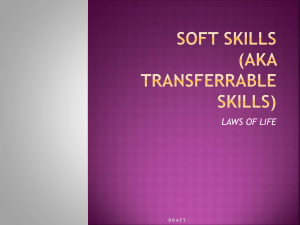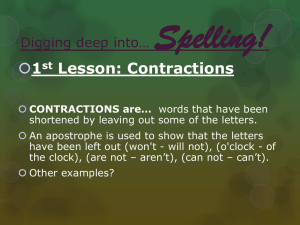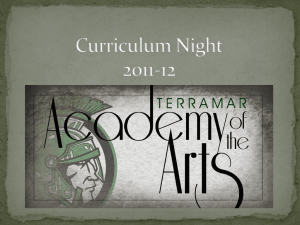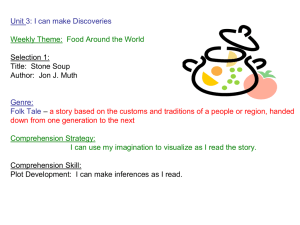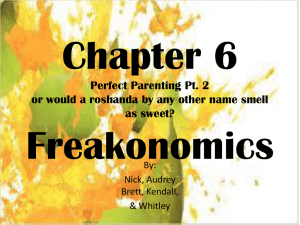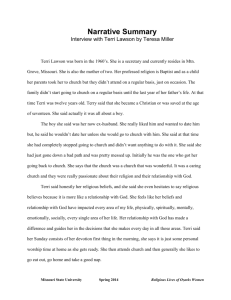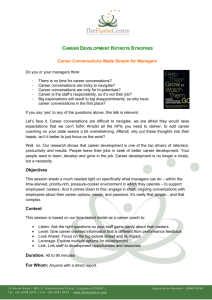Case Study Lesson Plans
advertisement
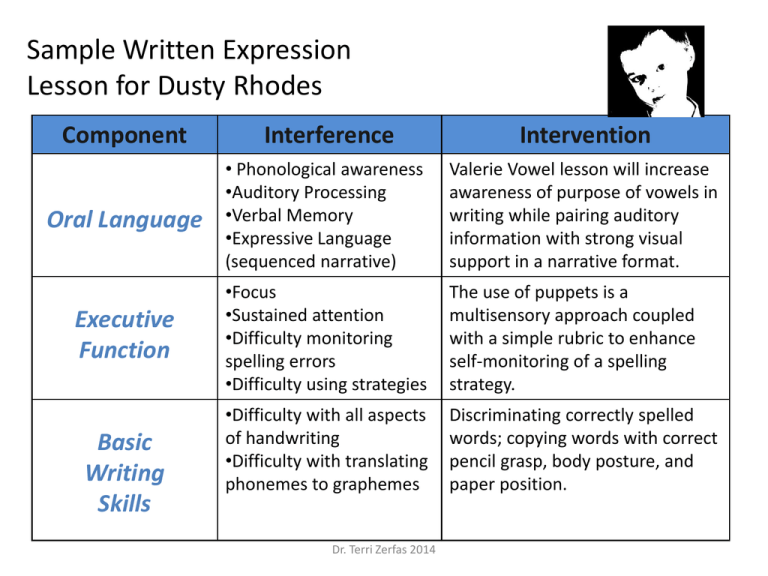
Sample Written Expression Lesson for Dusty Rhodes Component Interference Intervention Oral Language • Phonological awareness •Auditory Processing •Verbal Memory •Expressive Language (sequenced narrative) Valerie Vowel lesson will increase awareness of purpose of vowels in writing while pairing auditory information with strong visual support in a narrative format. Executive Function •Focus •Sustained attention •Difficulty monitoring spelling errors •Difficulty using strategies The use of puppets is a multisensory approach coupled with a simple rubric to enhance self-monitoring of a spelling strategy. •Difficulty with all aspects of handwriting •Difficulty with translating phonemes to graphemes Discriminating correctly spelled words; copying words with correct pencil grasp, body posture, and paper position. Basic Writing Skills Dr. Terri Zerfas 2014 Sample Written Expression Lesson for Wendy Day Motivation: Use of Wendy’s art Component Interference Oral Language •Articulation •Auditory Processing •Language comprehension (inferences, predicting, drawing conclusions) The use of language frames for argumentation will be developed in classroom and used for articulation/language practice with the speech therapist. The school counselor can also use this format to assist Wendy with asking questions with peers. Executive Function •Working memory (remembering directions and content) •Self-regulation (planning, monitoring, adjusting) The use of language frames as a graphic organizer will enhance Wendy’s ability to remember the content and provide a structured system for self-regulation of her writing. •Slow rate of writing •Difficulty understanding morphological rules for spelling •Difficulty withDr.syntax Terri Zerfas 2014 The “fill-in-the-blank” format will serve as an accommodation for Wendy’s slow rate of writing. The use of suffix –ed in the frame will provide practice in morphological awareness. The frame models appropriate syntactical structure. Basic Writing Skills Intervention Sample Written Expression Lesson for Jack Hammer Component Oral Language Executive Function Basic Writing Skills Interference Motivation: Jack’s interest in math and entrepreneurship. Intervention •Processing oral directions The use of the questionnaire •Requests for repetition reduced the need to rely solely on and/or clarification does auditory information. not improve performance •Processing speed significantly discrepant from cognitive ability •Working memory issues result in mental fatigue •Distracted when writing •Poor cognitive flexibility when editing The use of a brainstorming questionnaire helped Jack maintain focus on the topic and relieved the working memory fatigue. Highlighting Jack’s strengths in math and his interest in entrepreneurship reduced distraction. The use of a rubric for the brochure enhanced his editing performance. •Poor writing fluency •Difficulty with spelling (orthographic and morphologic rule application) •Difficulty with syntactic structure and mechanics The use of the language frame and technology bypassed writing fluency issues, as well as difficulty with spelling, mechanics, and syntactic structure. These areas of weakness will be addressed during the writing process when Jack writes a summary of the brochure project. Brochure is an alternate assignment. Dr. Terri Zerfas 2014 Sample Written Expression Lesson for Justin Case Component Oral Language Executive Function Basic Writing Skills Motivation: Justin’s interest in music and technology. Interference Intervention •Uses pauses or fillers •Frequent use of nonspecific words •Difficulty remembering instructions or directions •Over-reliance on context to understand •Difficulty making inferences, predicting outcomes, drawing conclusions •Limited vocabulary •Difficulty giving directions/explanations •Difficulty with sequenced narrative •Explanations, stories, etc. lack detail Preteaching vocabulary and the meaning of the figurative language in the lyrics addresses weaknesses in receptive and expressive language. Sequencing the “story” in the lyrics provides an opportunity to narrate details. •Perseverates on topics, sentences or words •Difficulty generating ideas for writing Discussion about repetitive lyrics in comparison to academic writing will provide an opportunity to clarify the differences. Use of Justin’s interest in this music will provide ideas for writing. •Frequent erasures and cross-outs •Poor writing fluency •Difficulty applying orthographic and morphologic rules •Confusion about homophones Lyrics contain a few affixes (un-, -ly, -s, -ing) to reinforce how affixes change use or meaning. Dr. Terri Zerfas 2014



